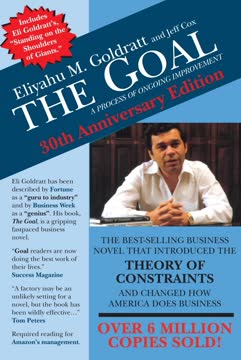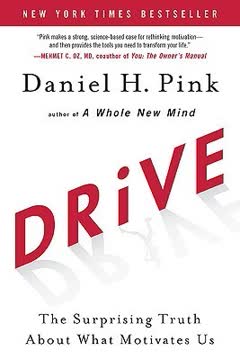Key Takeaways
1. Work-Life Balance is a Myth; Seek Satisfaction Instead
People need and want a satisfying experience of life.
The term "work-life balance" is flawed. Introduced with good intentions, it mistakenly separates work from life, implying they are opposing forces. This conversation has dominated for two decades, yet surveys show people feel less balanced than before, leading to frustration and demands for working less, not more effectively.
Balance is not the true desire. When people express a need for work-life balance, they are often articulating a deeper yearning for fulfillment and contentment in all areas of their lives. They want to know that personal priorities don't have to be sacrificed for professional success.
Satisfaction is the ultimate goal. Instead of the elusive concept of balance, what people truly seek is personal and professional satisfaction (PPS). This is possible and sustainable, unlike the artificial environment required to maintain perfect balance.
2. Your Personal and Professional Lives Are Deeply Linked
It is impossible to completely separate the personal from the professional; they are deeply intertwined.
You have one life, not two. While there are distinct personal and professional aspects, they are not separate entities. Events and feelings in one area inevitably spill over and influence the other, for better or worse.
Interconnected influence is undeniable. If you are distracted by a sick family member at home, your focus at work will suffer. Conversely, success and positive energy from a work project will carry over into your personal life and relationships.
- Personal issues (sick spouse, death of loved one, having a baby) affect professional performance.
- Professional matters (meeting targets, landing a client, job stress) affect personal well-being.
Ignoring this link is detrimental. Corporate attempts to demand employees leave personal lives at home have failed because this separation is unnatural and impossible. Recognizing and managing this interconnectedness is crucial for both individual well-being and organizational effectiveness.
3. You Cannot Have It All: Life Demands Choices and Priorities
The reason you cannot have it all is simply because one of the governing principles of the universe dictates that there are an infinite number of possibilities for any day, year, or life—and every day, year, or life is finite.
Accepting limitations is maturity. Acknowledging that you cannot pursue every possibility simultaneously is a fundamental lesson of growing up. Life is finite, and choices must be made, inherently eliminating other options.
Excellence requires sacrifice. Achieving high levels of success in any field, personal or professional, demands giving up other things. Whether it's becoming a top athlete, a leading executive, or a highly engaged parent, dedication in one area necessitates trade-offs in others.
- Becoming the best at your job requires sacrificing time/energy elsewhere.
- A working parent makes different trade-offs than a stay-at-home parent.
The work-life balance myth obscured this truth. The conversation sometimes implied that with the right approach, you could achieve everything without compromise. This is unrealistic and leads to frustration when the inevitable need for choices arises.
4. Avoid Destructive Philosophies: Individualism, Hedonism, Minimalism
Individualism, hedonism, and minimalism will destroy every individual and community that practices them.
Modern culture promotes harmful creeds. Three practical philosophies are eroding personal character and organizational effectiveness:
- Individualism: "What's in it for me?" Focus on self-concern, leading to greed and selfishness.
- Hedonism: "If it feels good, do it!" Emphasis on pleasure as the ultimate goal, leading to laziness and addiction.
- Minimalism: "What is the least I can do?" Seeking maximum reward for minimum effort, leading to mediocrity.
These philosophies are ancient and failed. Presented as new freedoms, they are based on ideologies that have historically led to decline in cultures and individuals. They prioritize fleeting desires over lasting fulfillment.
They hinder satisfaction and management. Operating under these philosophies makes managing people difficult and leads to decreasing levels of personal and professional satisfaction. They are lazy answers to the question of how best to live.
5. The Best Way to Live: Be Your Best Self, Practice Virtue, Have Self-Control
The best way to live, therefore, is in such ways that help you become the-best-version-of-yourself.
A universal principle for living well. The primary purpose of life is to strive to become the best version of yourself. This principle provides a practical guide for daily choices – saying yes to what helps you grow and no to what diminishes you.
- Good friends, healthy habits, meaningful work all support becoming your best self.
- Anything that doesn't help you improve is "too small" for you.
Virtue is the organizing principle. In the classical sense, virtue (patience, generosity, courage, humility, honesty) is essential for strong relationships and thriving communities, whether a family, team, or nation. It is the essence of excellence.
Self-control is fundamental. The ability to delay gratification is crucial for sustainable success in life, work, and relationships. Individualism, hedonism, and minimalism undermine self-control, leading to inability to delay gratification and hindering long-term achievement.
6. Satisfaction Trumps Pleasure and Requires Effort
The fundamental difference between pleasure and satisfaction is that pleasure cannot be sustained beyond the activity producing it.
Pleasure is fleeting, satisfaction endures. Pleasure is tied to the immediate activity (like eating) and stops when the activity does. Satisfaction, however, can be sustained long after the activity is over (like the feeling after a challenging workout or project).
Confusing pleasure and satisfaction is common. Many people chase pleasure, believing it will bring lasting happiness, but it often leads to an unquenchable yearning for more. Addiction is a prime example – wanting more of something that brings less satisfaction over time.
Genuine satisfaction often follows effort. The deepest satisfaction frequently comes after overcoming challenges, periods of stress, or delaying gratification. It is not the easy path but the one that builds character and provides lasting fulfillment.
7. Energy Management is Key to Expanding Your Life Capacity
Your experience of life expands with the more energy you have.
Beyond time management. While time management was crucial in the past, the next leap in human excellence will come from energy management. Having more energy directly increases your capacity to embrace, absorb, and enjoy life's experiences.
Tiredness reduces capacity. Feeling tired most of the time is not just a physical state; it's a reduced capacity for life. It limits your ability to pursue passions, engage in relationships, and perform at your best professionally.
Recognizing energy flow is vital. We need to become acutely aware of the people, places, things, and activities that either energize us or drain us. Managing this flow intentionally is crucial for sustaining high energy levels.
8. Everything Requires Energy; You Control Your Levels
Everything in life requires energy.
Energy fuels all aspects of life. From getting out of bed to managing finances, nurturing relationships, progressing in your career, and parenting, every activity demands energy. Lack of energy limits potential in all areas.
Fatigue hinders courage and effectiveness. Being constantly tired makes it difficult to live with courage, especially in challenging situations like managerial accountability. Fatigue makes cowards of us all, leading to survival mode rather than thriving.
You can increase your energy. Simple habits can significantly boost your energy levels.
- Adequate quality sleep
- Healthy food and hydration (e.g., drinking a gallon of water daily)
- Regular physical activity
- Pursuing passions and interests
- Managing draining interactions and activities
9. Systems, Not Just Intentions, Drive Consistent Behavior
Systems drive behaviors.
Intentions are not enough. People often know the desired outcome and the behaviors needed to achieve it, but they struggle with consistency. This is where a well-designed system becomes essential.
Systems ensure sustainability. Just as McDonald's relies on a robust system to deliver consistent results globally, individuals need a system to drive consistent behaviors that lead to personal and professional satisfaction.
- A good system connects desired outcomes with consistent behaviors.
- It helps overcome inconsistency, which is the gap most people fail to cross.
Lack of a system led to the "balance" disaster. The failure of the work-life balance movement was partly due to the absence of a comprehensive system for people to implement, leaving them with ideas but no practical framework.
10. Build Your Satisfaction System: Assess, Prioritize, Habitualize, Plan, Review
If you want to increase the level of personal and professional satisfaction that we experience in our lives, we need to approach it strategically.
Satisfaction requires a strategic approach. It doesn't happen by chance. A structured system is needed to design and build a deeply satisfying life. The proposed system has five interconnected facets:
- Assessment: Identify areas of dissatisfaction (using a scorecard).
- Priorities: Define what matters most (using a priority exercise).
- Core Habits: Establish daily routines that ground and energize you.
- Weekly Strategy Session: Plan your week based on priorities and habits.
- Quarterly Review: Evaluate progress and adjust the system.
Consistency is key to the system's success. Neglecting any part of the system can cause it to break down. Those who faithfully follow the process see significant increases in satisfaction.
Take a long-term view. Building a satisfying life is like building a castle, one brick at a time. Focus on what you can achieve in a decade, not just a day or a year, to fully explore your potential.
11. Define Your Priorities to Guide Choices and Avoid Urgency
Without clarity around what matters most, without a clear value and priority structure that we can commit to, our lives tend to get kidnapped by the urgent.
Priorities provide direction. Establishing a clear list of priorities is critical because without it, everything seems equally important, and we become reactive, constantly addressing whatever feels most urgent rather than what is truly important.
A value structure informs decisions. Your priorities act as a guide and touchstone, helping you make choices that honor what matters most, even amidst constant change and pressure. This structure clarifies why you do what you do each day.
- Example: Prioritizing family over a never-ending meeting.
- Priorities are value statements, not just time allocation rules.
Ignoring priorities has consequences. Mortgaging higher priorities (like health or marriage) for lower ones (like work) leads to significant negative outcomes, personally and professionally. Personal clarity about priorities leads to better professional decisions.
12. Measure Your Satisfaction to Drive Improvement
If you cannot measure something, you cannot change it.
Measurement is fundamental to change. Just as successful businesses measure everything to drive improvement, individuals must measure their satisfaction levels to understand where they are and track progress.
Regular assessment provides insight. Using a tool like the provided satisfaction scorecard allows you to pinpoint specific areas of dissatisfaction (scoring low) that require immediate attention.
- Identify questions where you scored 'a' or 'b'.
- Reflect on what actions could move your score higher in those areas.
Tracking progress reinforces effort. Regularly taking the assessment (e.g., quarterly) helps you monitor changes over time and reinforces the intentional effort you are putting into increasing your satisfaction. It provides a tangible system for accountability and growth.
Last updated:
Review Summary
Off Balance receives mixed reviews, with an average rating of 3.84/5. Readers appreciate Kelly's fresh perspective on work-life satisfaction rather than balance, and his emphasis on energy management. Many find the book practical and insightful, praising its focus on personal responsibility and becoming one's best self. However, some criticize the book for being repetitive, lacking actionable steps, and having a corporate-centric view. Critics also note that Kelly's approach may not resonate with those who view work solely as a means to an end.
Similar Books









Download PDF
Download EPUB
.epub digital book format is ideal for reading ebooks on phones, tablets, and e-readers.














